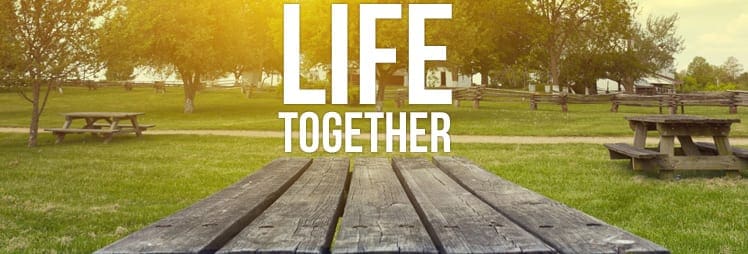 If you’re around me or around this school for any length of time, you’ll hear us constantly harping on the importance of community. One of the greatest strengths of Grace is the sense of community that exists within our school and among our faculty and families. It is that great intangible thing that people cannot “put their finger on”, but always notice when they walk through our halls, attend our events, or come to other school gatherings.
If you’re around me or around this school for any length of time, you’ll hear us constantly harping on the importance of community. One of the greatest strengths of Grace is the sense of community that exists within our school and among our faculty and families. It is that great intangible thing that people cannot “put their finger on”, but always notice when they walk through our halls, attend our events, or come to other school gatherings.
This is what sets our Grace family apart: strong, trusting relationships among families, among teachers, and among teachers and administrators. In an intensely relational ministry like a school, trust and goodwill are foundational to creating an environment in which kids can learn and thrive. We even have a unique name for it, so important to who we are it’s one of our core values: redemptive community.
But, community can exist anywhere. As a friend recently reminded me, a community is just a gathering of people, rallied around a common purpose that may or may not be God-honoring. What makes Grace a divinely-empowered learning community, a redemptive community, is that:
- The school climate is rooted in God’s Word.
- The school community’s focus is on Christ, and a realization that what students and families see in all of us is even more important than what we say.
- The school environment reflects the character of God.
- Prayer undergirds everything we do.
- Our school family depends on the Spirit of God to renew them, and make them better than they were before.
- People are most important to God; therefore, people are more valued than stuff, policies, or practices around here.
Redemptive Christian community, that which makes Grace a great school, takes work. You don’t see it in most places, because it just takes so much energy and effort. It requires us to stay on our knees before our Creator. It means that we serve each other, even (especially?) when it is neither comfortable nor convenient to do so. It mandates that we keep short accounts, that we are willing to quickly forgive and to seek forgiveness. It compels us to strengthen each other when part of us really wants to strangle them. And, it requires us to always remember that our children’s hearts and holiness are more important than their comfort and achievement.
Redemptive Christian community is messy. It means admitting to each other that we’re not awesome, that we’re all works in progress, and humbling ourselves before each other. It requires us to dig into the muck and mire of each other’s lives, getting our hands dirty in the process of engaging in each other’s life renewal projects. It means running into the crazy, when every selfish impulse is telling us to get the heck out of there. And, it requires bucketsful of empathetic suffering, as we enter into each other’s deepest pain. We gripe about each other, which we know we shouldn’t, but we’d die for each other. Like my friend who recently visited our school described us, “The good news is, you’re a family. The bad news is, you’re a family.”
I wouldn’t want it any other way. Because in a family, a redemptive family, kids feel safe. They know they are loved. They feel free to ask questions, to take risks, to explore areas they might not otherwise investigate. In a redemptive family, it’s okay to ask questions about your faith, knowing you will be met with honest answers, even when the adults don’t have all the “right” ones. When life knocks a kid down, a redemptive family picks him up, and encourages him. It doesn’t coddle or enable him, because that leaves him ill-equipped for life’s challenges, but sets him on his feet to try again. He has the freedom to fail, which means the freedom to learn, to become resilient and gritty–in short, he has the freedom to grow.
A redemptive community is rocket fuel for learning. It glorifies God and creates a signpost of righteousness, pointing to the way things once were before we all lost our way, and the way it all someday will be again. It models what it teaches, and creates a culture where kids see that this ancient God is an eternal person and a way of life that really works in the here and now, a way that is really attractive, even when it’s really hard.
Because it’s hard, we’re always tempted to walk away. The greatest joys of community, or family for that matter, are always at the far end of the pool-you have to swim, to work, for them. They’re always reserved for the resilient, for those who stay, for those who fight because they love. Doing life together, in all its beautiful, agonizing, glorious mess, is the Grace Way, and the best way.
Leave a Reply